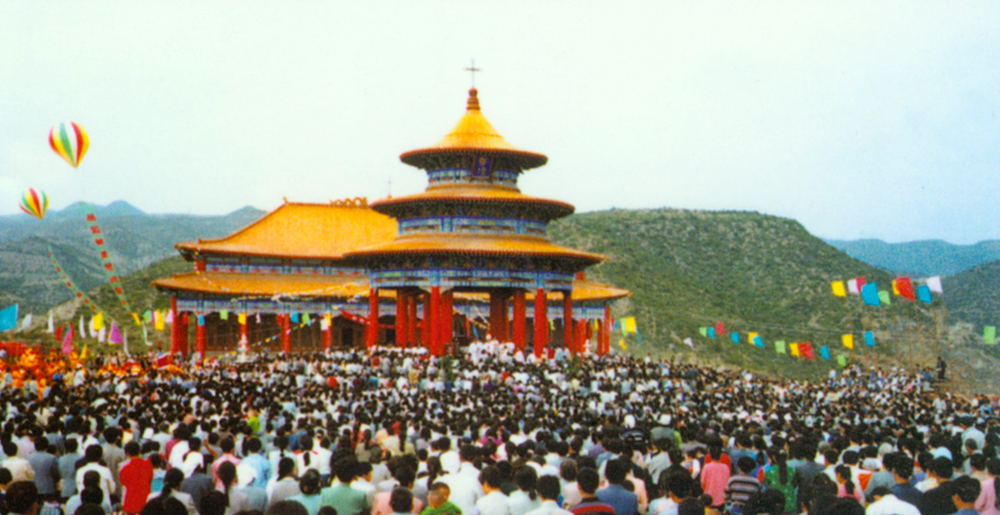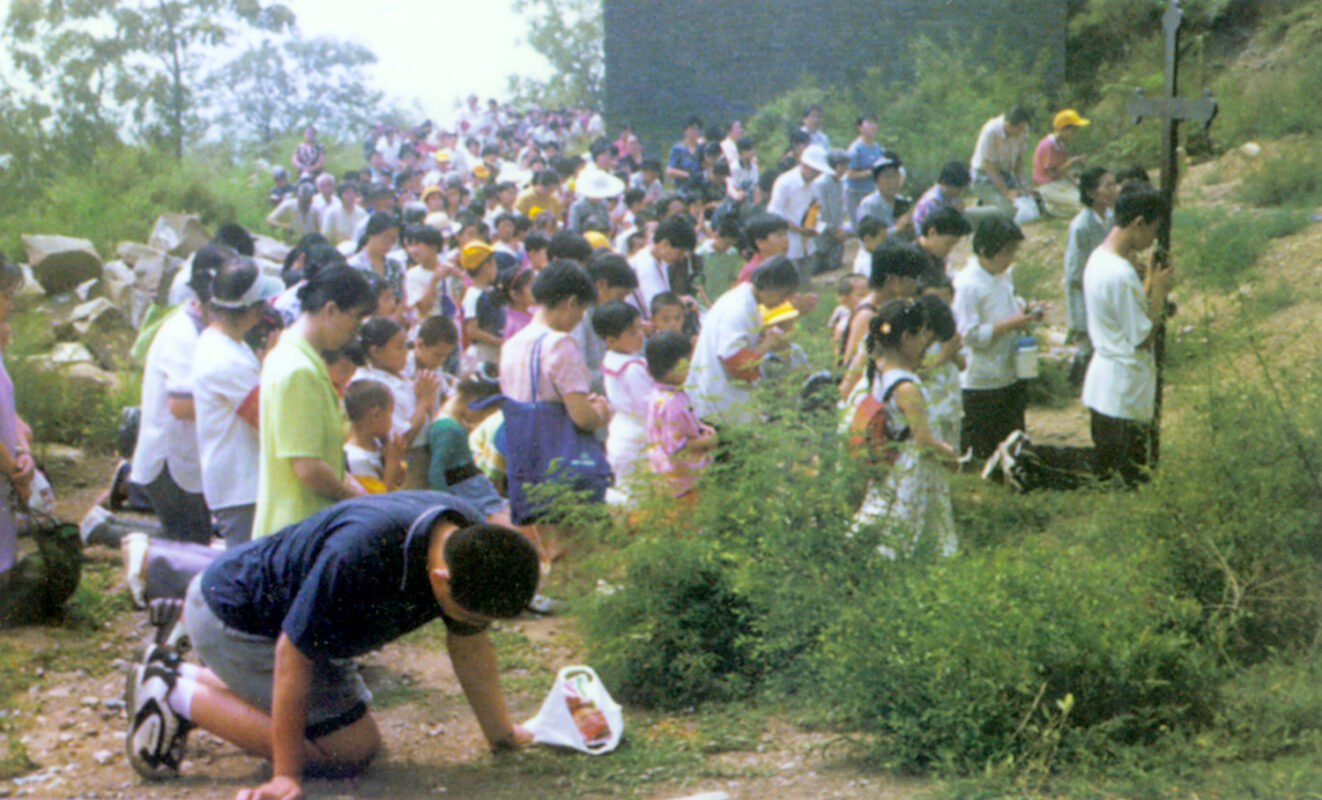
China Bridge (神州橋樑)_2005/May
China celebrates Mothers Day
Throughout the Catholic world, May is Our Lady’s special month. Catholics feel that by honouring Our Lady, all women are being honoured. May is also Our Lady’s special month for Catholics in China. Thousands of pilgrims flock to her shrines throughout the country. Some make their way walking for hours or even days up high mountains while others take to the various waterways that lead to villages with shrines honouring Our Lady.


Folklore origin of Mothers Day
In many countries May is also a month when we honour mothers with a special day designated as “Mothers Day.” Mothers Day celebrations date back to spring celebrations in ancient Greece in honour of Rhea, the mother of the gods and goddesses. The pagans in Rome honoured the same goddess under the name of Cybele. As the number of Christians increased and devotion to Our Lady grew, many believe that the Christians used the celebrations for Cybele as an opportunity to venerate Mary the Mother of Jesus and our spiritual Mother. Mothers Day celebrations have their roots in folklore and are of long standing.
Countries celebrating Mothers Day
Today, Mothers Day is celebrated in Africa, Australia, Bahrain, Belgium, Canada, China, Denmark, Finland, Great Britain, Hong Kong, India, Italy, Japan, Malaysia, Mexico, Oman, Pakistan, Qatar, Saudi Arabia, Singapore, South America, Turkey, the United Arab Emirates, and the United States.
Mothers Day is both a day for children to say thank you to their mothers and also a way to recognise the contribution of other women who spend their lives nurturing their local communities and their church.
Since China is mentioned among the countries that observe Mothers Day, China Bridge decided to explore how, given the position of women in China throughout the ages, China arrived at celebrating Mother’s Day.
Women in China before 1950
For some 4,000 years, women in China were not held in very high esteem. There were strict rules governing their place and behaviour in society. A woman’s life was governed by the Five Cardinal Confucian Relations and by Mencius’s “Three Obediences:” first to their father as children, then to their husband as wives and to their eldest son as widows.
Women in Asia strove unsuccessfully for centuries to shed this yoke and were actually lucky if they had managed to escape infanticide. They were restricted, seldom educated, given in marriage without their consent, and used by their in-laws as servants. Women were not allowed to inherit or own property, and some were bought and sold as ordinary commodities.
Changes in politics and industry, and the Taiping Rebellion in the 19th century called for changes in the status of women and gave women a taste of liberation. But it took Mao Zedong to change millennia-old patterns of behaviour.
The People’s Republic of China
With the advent of the People’s Republic of China in 1949, tremendous changes quickly began to take place in the role of women in the home and in the workplace. Mao quickly recognised that the New China needed women to succeed. To deny women their social and political rights was an abuse and a misuse of talents previously untapped.
Reversing centuries’ old attitudes
For thousands of years, women had been subservient to men. Given China’s long history and traditions, what Mao achieved was nothing short of radical. It meant a reversal of deep-seated mental attitudes of long-standing and honoured traditions. This required a drastic upheaval in State doctrine, in short, in the official position of the government towards women.
The 1950 constitution guaranteed women equality with men. For the first time, women were given the legal right to choose their own husbands; they could even sue for divorce and foot-binding, which had kept women inconveniently at home and finally went out of style altogether.
Mao’s ideas were still so revolutionary that they could not and would not be achieved without inflicting considerable damage on the existing social and political structures and on their moral underpinnings. To effect so great a social reversal of values, Mao would have to get rid of Confucius. This was no easy task.
Confucian philosophy and ideology were at the very heart of Chinese society. It meant unravelling China’s whole family system. Women within the existing Confucian system had no mind of their own. They were used to thinking that “A woman’s duty is not to control or take charge.”
They had long been brainwashed into the belief that “women’s greatest duty is to produce a son.” Women had been trained to “look on her husband as if he were heaven itself and never weary of thinking how she may yield to him.” Women were admired only for their selfless, quiet, submissive loyalty. There was a general acceptance that women were inferior to men, and therefore, their subservience was only natural and proper.
In the book The Chinese Have a Word for It, The Complete Guide to Chinese Thought and Culture, the author, Boye Lafayette De Mente, in the chapter entitled “My Mother’s House,” writes that Mao liberated women “by causing hundreds of thousands of men to be exterminated, millions to be imprisoned, and other millions to be separated from their families by forced labour in remote areas of the country.”
He maintains that the Cultural Revolution (1966-1976) broke up every urban family by assigning wives to work in areas away from their husbands, placing young children in care centres and sending young people off to rural areas as workers. Given this situation, the women had to learn to fend for themselves and to survive.
This shift in attitudes does not preclude the fact that the Chinese still value the male over the female and, although not sanctioned by the government, thousands of female babies are aborted or abandoned yearly in China.
In spite of this, however, it is also safe to say that women have made great strides in achieving equal status with men. This trend will surely continue. But how did China come to honour women and celebrate Mothers Day?
How China came to celebrate Mothers Day
Never having heard of a Mothers Day celebration in China, China Bridge went on the Internet in search of information. Mothers Day is not widely celebrated, but the Internet confirmed that China has been celebrating Mothers Day since 1995 in an area called Wang’er Hill, Yingkou, in Liaoning Province.
Mothers Day celebrations at Wang’er Hill have become a business bonanza and a popular tourist attraction. China’s Mothers Day celebration is also founded in folklore, albeit one quite different from the rest of the world.
According to legend dating back some 10,000 years, recounted on the Yingkou China English website, a mother lived with her son in Xun Yue City, which was surrounded by the sea.
The mother was deeply devoted to her son and eager for him to have a good future. She urged him to study hard. She worked day and night for his benefit. During the day, she worked in the fields and she spent her nights spinning cotton and weaving. The son loved his mother and worked diligently.
Then one day, the mother learned that the imperial court was giving an examination to find a person qualified for an important position. The son decided to take the examination. To do this he had to travel by sea to Beijing.
As her son was leaving, the mother begged him to take care of himself and to do his best in the examination. Whether he passed or not was not so important, however, as his prompt return home. The son promised to come back as soon as he had finished taking the examination.
While he was gone, the mother continued to work in the fields by day and weave by night. But her son failed to return, so daily she would make her way to the shore always expecting his return.
The years passed and the mother grew old. Her hair turned grey. Summers and winters came and went. The years went by. She was now old and wrinkled. Ten years, 20 years and now 30 years had passed and her son had never returned.
Eventually, the mother passed away and turned into a stone statue looking out to the ocean waiting for her son. Unfortunately, the son had drowned in the ocean on his way to Beijing to take the examination.
According to the legend God was so moved by the devotion of the mother for her son that he formed a hill where the mother had stood so long looking into the far distance for the son who would never come home. The earth was so moved by the mother’s sufferings that it turned her tears into a hot spring that watered the earth and produced lovely and luscious red apples.
The villagers were so moved that they named the hill for the mother. They called it Wang’er Shan, which means “expecting the return of the son”. On the top of the hill they built a brick tower and at the bottom of the hill they built a memorial to remind the younger generation of the mother’s devotion for her son.
Every Sunday in May the people of Xun Yue gather to remember and to celebrate Mothers Day, but especially the mother who now stands in stone still waiting for her son.


 ENG
ENG